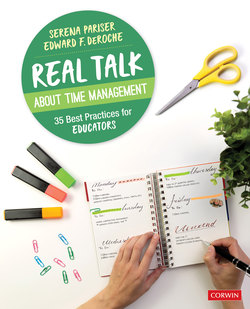Читать книгу Real Talk About Time Management - Serena Pariser - Страница 15
На сайте Литреса книга снята с продажи.
Strategy #3 You Have So Much to Do—Why?
ОглавлениеWhen everything seems to be going against you, remember that the airplane takes off against the wind, not with it.
—Henry Ford
We will be up front with you by giving you a direct answer to the question above. You have so much to do because you are a teacher. There will never be enough time. That’s the nature of our profession. We have worked with teachers who handled their workload effectively, we’ve worked with teachers who got stressed daily, and we’ve sadly worked with teachers who “burned out” and started cutting corners (e.g., giving students worksheets so the teacher could take a break, taking sick days, leaving school at the sound of the bell).
According to the 2017 Educator Quality of Work Life Survey, which captured the data of nearly 5,000 teachers and staff, “Educators and school staff find their work ‘always’ or ‘often stressful’ 61 percent of the time, significantly higher than workers in the general population, who report that work is ‘always’ or ‘often’ stressful only 30 percent of the time” (Badass Teachers Association, 2017). In a short piece titled “Why Teachers Quit,” Elizabeth Mulvahill quoted a teacher who succinctly described the stress teachers are under: “We get bombarded with paperwork, ridiculous curriculum, and lack of time along with unrealistic expectations” (Mulvahill, 2019).
But remember, 95 percent of you love your jobs. Hold on to that love.
So what can you do about all that you have to do? We have seven suggestions that work for us. We hope they work for you too.
1 Be prepared. You are in a very busy profession: Admit it, deal with it, and prepare yourself for it. Prioritize what you plan to do each day based on what you can realistically accomplish.
2 Be in control. This means take charge of what you and others want you to do and be realistic about your limits. Set manageable objectives and develop a plan to implement them. Don’t be afraid to ask for feedback on how you are doing. Catch yourself when you get distracted and get back on track.
3 Be collaborative. Teaching can be a lonely profession. Do not let it be so for you. Engage in meaningful exchanges with colleagues, administrators, parents, and educators in your community. Join education organizations. Teach a unit with your grade-level team. Collaborators can be a valuable resource for managing time, enriching instruction, and expanding your network of support. Two minds are often better than one. And three minds are often better than two . . . you get the idea.
4 Be positive. You will experience ups and downs in this profession. Research suggests that positive emotions are contagious. Your students will remember some of what you say but a great deal of how you made them feel. Our advice: Celebrate all positive events in and out of school with people you care for.
5 Be purposeful. You had a reason, a purpose for becoming a teacher. You had an interest in working with children and young people. Your purpose was captured in your commitments, your objectives, and your motivations to do what you love to do. Your teaching purpose is fueled by your desire to teach the young, to collaborate with others, to become a member of the team and maybe its leader. Your purpose is your sense of developing the “whyness” of things and finding out what works and what doesn’t.
6 Be a problem-solver. To solve a problem you have to know that you have one and what its complexities are. In general, we suggest this problem-solving framework:Step 1—Identify the problem.Step 2—Examine potential solutions.Step 3—Develop and implement one or more of the solutions.Step 4—Assess whether or not your solutions solved the problem.Step 5—Decide whether the problem is solved or if you should repeat steps 1–4.
7 Know the difference between busy and productive. We need to constantly ask ourselves: Am I just staying busy or am I being productive?
Your Turn
1 In past month or so, would you say you were more busy or productive? Why is that and do you need to change something?
2 What part of your job do you absolutely love? As you start taking things off your plate, be sure not to discard your favorite activities.
3 How many of the seven tips are you already doing? Which of them work for you? Is there one you’d like to start doing in the future? Is there something we may have left out? Please share your ideas.
